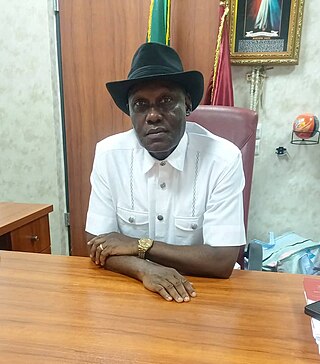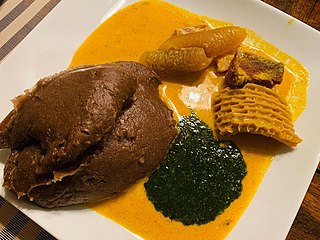
The Esan people are an ethnic group of southern Nigeria who speak the Esan language. The Esan are traditionally known to be agriculturalists, trado-medical practitioners, mercenary warriors and hunters. They cultivate palm trees, Irvingia gabonensis (erhonhiele), Cherry (Otien), bell pepper (akoh) coconut, betel nut, kola nut, black pear, avocado pear, yams, cocoyam, cassava, maize, rice, beans, groundnut, bananas, oranges, plantains, sugar cane, tomato, potato, okra, pineapple, paw paw, and various vegetables.

Ogbidi Okojie, Onojie (king) of Uromi, was a ruler of the Esan people in what is now Edo State in Nigeria, still remembered for his opposition to British rule.
Christopher G Okojie OFR DSc (1920-2006) was a Nigerian doctor, politician, administrator and historian. He was born in Ugboha, in present-day Edo State, Nigeria. He was leader of the Mid-West Regional House of Assembly from 1964 to 1966. He was a former Health Minister of the Federal Republic of Nigeria (1992) and president of the Nigerian Medical Association (1974-1975). As minister, he was instrumental in pushing ahead a National Insurance Health Scheme. He died on October 7, 2006, at the age of 86. During his tenure as minister, he was able to bring roads and bore-hole water to the people of Esan.

Esan North-East is a Local Government Area located in Edo State of Nigeria. It has an estimated population of 119,346. Its headquarters are in Uromi/Uzea.

Uromi is a city located in north-eastern Esan, a sub-ethnic group of the Edo people in Edo state, Nigeria. At various points in Uromi's history, the city and people have been an important part of the Benin Empire.

Esan Central Local Government Area is a Local Government Area of Edo State, Nigeria. Its administrative headquarters is located in the town of Irrua.
Owan East is a Local Government Area of Edo State, Nigeria. The headquarters is in the town of Afuze. The Owan East Local Government Area comprises 69 towns/villages made up of eight clans.

Ekpoma is a town in Edo State, Nigeria. It is the administrative headquarters of the Esan West Local Government Area. Ekpoma lies on the geographical coordinate of latitude 6°45′N6°08′E. The town has an official Post Office, and it is home to the Ambrose Alli University. Currently Ekpoma town is developing with major infrastructures, hospitals, schools, modern eateries and roads. The town is also secured.

Ewu is a Nigerian town situated in Esan Central Local Government Area in the Edo State of Nigeria. The city, an Esan tribe, lies on 200 feet in the plateau region of central Edo State, 100 kilometres north of Benin City, the capital of Edo State, Nigeria.
https://www.google.com/maps/place/Ibore+Primary+School/@6.7805373,6.2879107,888m/data=!3m2!1e3!4b1!4m5!3m4!1s0x10469971d1cdd059:0xa4ee050796069788!8m2!3d6.78077!4d6.2899666
Ogwa is a town in Esan West Local Government Area in Edo State, Nigeria. It is among the constituent communities of Esanland. The people of Ogwa speak the Esan language. The language of the Esan people shares the same name as the name of the land itself. Esan and Ishan are interchangeably used to refer to the same place, language and people. Ishan is the anglicized variant for Esan. The Ogwa people in Edo State identify themselves as Esan or Ishan people. Ogwa has four clans: Eguare, Ukpogu, Izogen and Eha. These clans are headed by most elderly men in each of them.

Esanland, otherwise known as Esan Nation, is a cultural region located in Edo State, Nigeria. It is composed of five Local Government Areas in Edo State. Esanland lies west of the banks of the Niger River. It is bordered by Kogi State, Delta State, Edo South Senatorial District, and Edo North Senatorial District. Esanland covers about 2,800 square kilometers and is home to over half a million people. The Esan people and culture of Esanland are generally homogenous.

Ebelle, one of the major Esan kingdoms in Edo State, Nigeria, is a populated place located in Igueben Local Government Area of Edo State, Nigeria. Within Ebelle are the villages of Owa, Ologhe, Okuta, Okpujie, Idumowu, and Eguare.

Clifford Ordia is a Nigerian engineer and politician who hails from Usugbenu Irrua in Esan Central local government area of Edo State. A Senator of the Federal Republic Of Nigeria from 2015-2023,who represented the people of Edo Central senatorial District, Edo State. in the Nigerian Senate and he is a member of the People's Democratic Party, PDP.
Agba N'Ojieof Uromi, originally called Agba, was the ruler of the Esan people from 1483 AD until 1507 AD. He is an important Onojie in the history of the Esan people. He was instrumental in the independence of Esanland from the old Benin Empire. He stopped tributes from Enijies in Esanland from being paid to the Oba of Benin and stopped any appeal cases being taken from Esanland to the Oba's Palace for retrial during the time of Ozolua n'Ibarmoi.

Idoa is an Esan community in Edo, Nigeria. The city, an Esan tribe, stretches through the highlands and plains of central Edo State. It is 120 kilometres north of Benin City, the capital of Edo State, having boundaries with Ekpoma in the west, Ukhun in the south, Ewu in the east and Agbede in the north. Residents are mainly farmers and grow crops, including yams, rice, cassava, taro and cocoa. The city of Idoa is currently made up of the following five clans: Afuku-N'Edo, Afokolo, Atologua, Ubi and Ofie.

Irrua is a town in Edo state and the administrative seat of the Esan Central local government area in Edo State Nigeria. Irrua was established by decree 92 of 1993 to provide tertiary services to people of Edo State and beyond.
Ujiogba is a community located in Esan West Local Government Area of Edo State, South South Nigeria. The community is headed by an "onojie" shares boundary with Ogwa community and Ehor Village. The community is largely an agrarian society and dominated by the Esan speaking people of Edo State.
EbhoIkhimi popularly called Ewohimi is an Ancient Kingdom in Esan South East Local Government Area of Edo State, Nigeria. EbhoIkhimi lies on the geographical coordinate of latitude 6°28′N6°19′E. EbhoIkhimi consists of several towns.

Edo traditional food consists of dishes or food items common among the people of Edo State. The State is home to various ethnic groups including the Binis, Ishan (Esan), Afemai, Etsako, Uzebba Iuleha people [Owan] and others. The Traditional food found among these people usually involves soup and swallow. 'swallow' is a term for Nigerian meals that are taken with soup and ingested without chewing.











